“Even though a Marshall sounded fantastic, I refused to play one. That’s my bad… I had a terrible sound for years”: Punk-grunge icon Donita Sparks on ironic gear choices, L7’s infamous Reading Festival set and why recording with Butch Vig was “maddening”
The Flying V die-hard started playing live for a dare. She looks back at first picking up the guitar, keeping going through the heartbreak years, and the enduring success of her “joyous anger anthems”
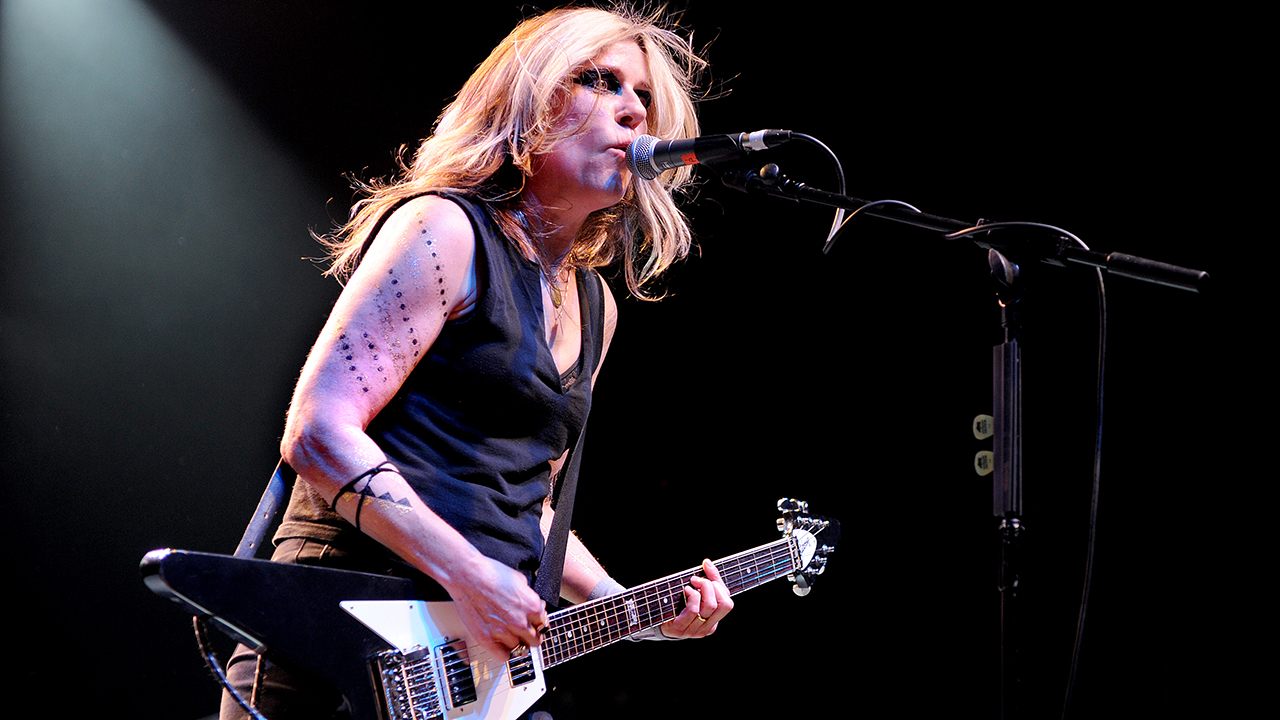
“I don’t like anything stock,” says L7 guitarist Donita Sparks. “I like to take a left turn wherever I can with my limited chops.” Raging grunge-meets-punk anthems like Pretend We’re Dead, Shitlist and Shove suggest she’s being too modest. “Part of my shtick is self-deprecation,” she admits.
Nobody writes as many great songs as she has by limiting themselves. The truth is that Sparks – along with bandmates Suzi Gardner (guitars), Jennifer Finch (bass) and Dementra Plakas (drums) is a punk icon. “Thank you!” she says.
“I love all kinds of music – I’ve been a music junkie since I was a kid. It gets in your brain, and if you’ve got good time, you can play. If you’ve got a little tone-deaf problem you can sometimes get through; but if you have a tough time with time, that’s challenging.”
Sparks doesn’t struggle with tone or time; and she’s not a gear-obsessed player either. “I’m appreciative of great gear but I wouldn’t call myself an aficionado. I make it work. Just put it in my hands – if it sounds like shit, I'm gonna make it work, even if I have to throw a rock through the speaker to get some goddamn distortion.”
L7’s first run, while successful, ended in heartbreak. “We’re cited as one of the first to do grunge,” Sparks says. “The difference is we were art punks. There were a lot of grunge bands that had guys who jumped from Rush to punk with nothing in between. We liked those bands too, but we didn't jump like that.
“We had more going on in between bands from our adolescence to our young adulthood. I think we had more weirdness in our influences.”
What led you to pick up the guitar?
Get The Pick Newsletter
All the latest guitar news, interviews, lessons, reviews, deals and more, direct to your inbox!
“My sister came home from college, and she’d been learning. She was doing scales on an electric guitar, like a three-quarter Gibson Melody Maker or something. I was just mesmerized by her fingers. And there were so few female guitarists at the time, so it seemed very punk to me to play guitar.
“I convinced my mom to get me a shitty electric guitar called a Norma, which I then referred to as ‘Rude Norma’ because it would feed back as soon as I plugged it in. That’s the guitar I took with me to LA.”
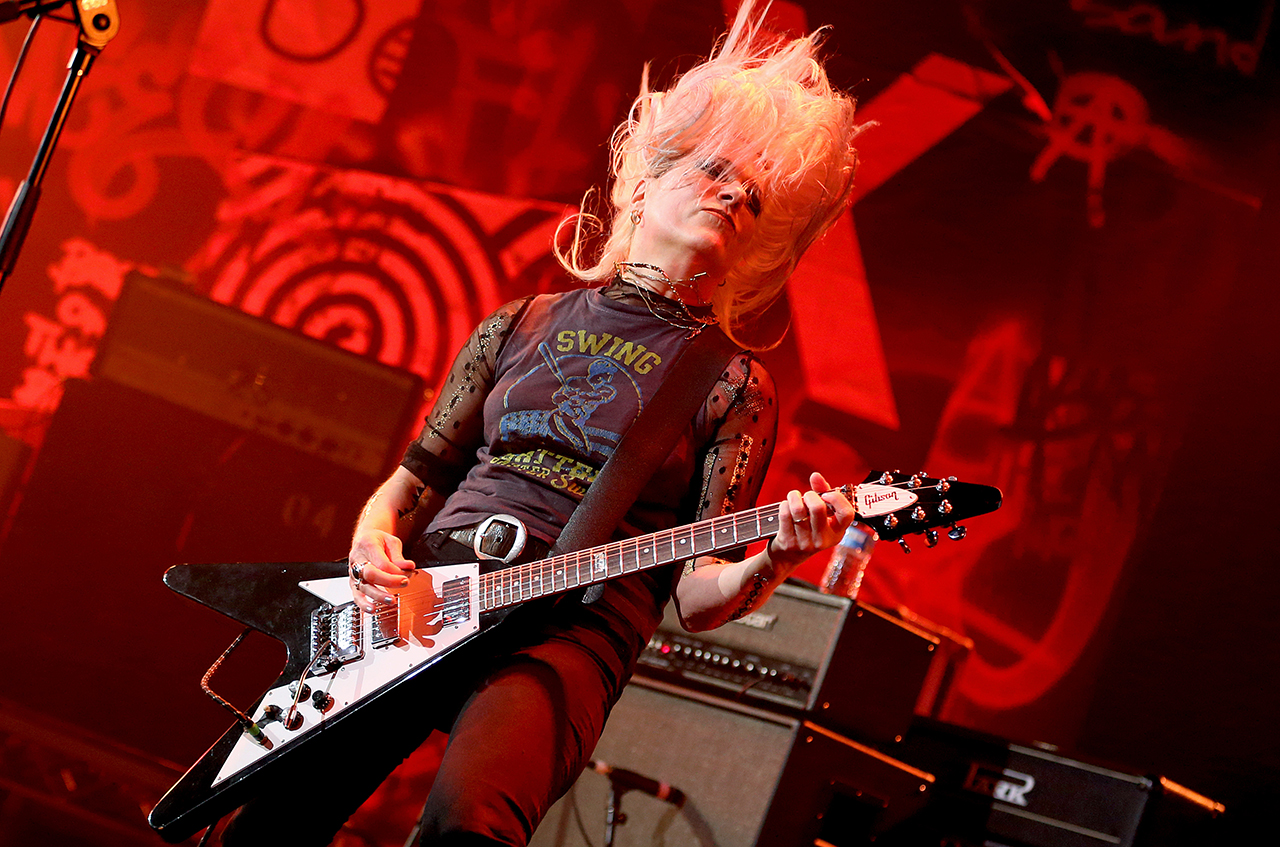
You grew up in Chicago. How did the local scene impact you?
“I grew up in the suburbs but I worked in the city. I would go from the suburbs into the city for nightlife as well – once I had my sister’s ID and I could get into clubs. I would also go to a lot of dance clubs; I really liked dancing to punk rock, Motown and all that stuff.
“There was a big dance scene in Chicago, but I’d go to concerts like Iggy Pop, The B-52s, The Cramps, Talking Heads and stuff like that. As far as local Chicago bands, I wasn’t really a follower; they just didn't have much visibility to me.”
What pushed you to move to LA?
“I was California dreaming from an early age. I knew I wanted to move out of Chicago, and I knew I wanted to move to a city. It was going to be New York, London, or LA – and I think the weather was the thing. I love a lot of surf music and surf culture. I kind of thought it was going to be like that out in LA. It wasn’t.
“I ended up in Hollywood. I loved the dingy, threadbare glamor – that’s what Hollywood and Hollywood Boulevard are. I love that feeling of yesteryear still around us, so I liked living in Hollywood. But what really got me going was getting a job at the LA Weekly, which was like the Village Voice of LA.
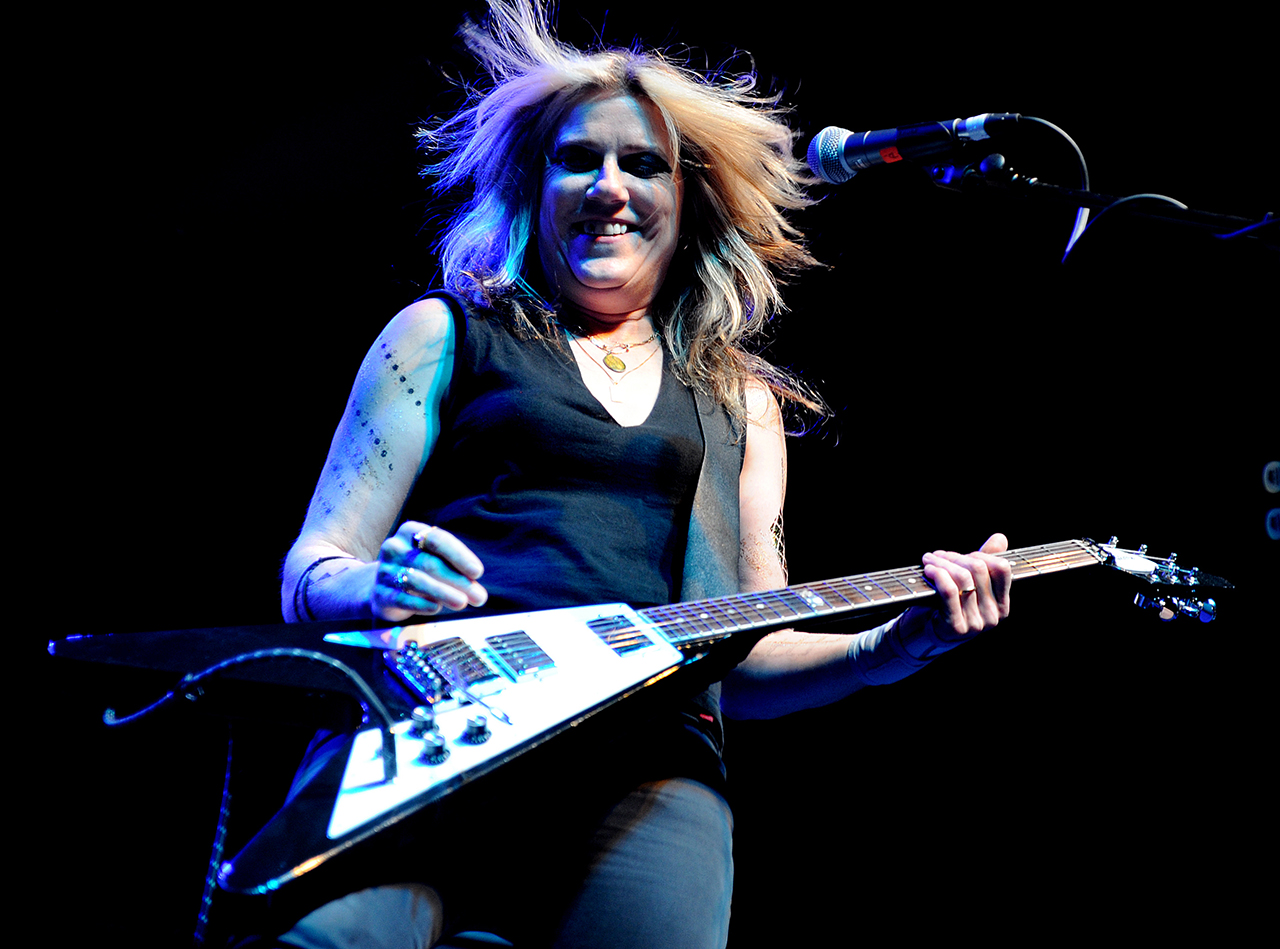
“I got into the art department, unbelievably, as an intern or grunt. There were tons of bands at the LA Weekly, and one of the secretaries dared me to go play guitar in her band – and I did. It was on a dare that I started playing guitar publicly.”
What gear were you using?
“I was playing on borrowed gear because Rude Norma was just impossible. When L7 started, we got gear; but even then, it was really inappropriate gear!
We didn’t want to do a new wave band; we didn’t want to do a roots rock, cowpunk band. We wanted to do something hard and sludgy
“Suzi and I were putting our amps on busboy stands because we didn’t have cabinets, just combo amps. Some friends of ours said, ‘When are you guys going to get serious – get some 4x12 cabinets and a head?’ That’s the gear we got later.”
When you first formed L7, what was your guitar vision?
“We wanted to play hard rock but were from a punk rock perspective. Suzi and I were kind of in the art punk world of LA. We didn’t want to do a new wave band; we didn’t want to do a roots rock, cowpunk band. We wanted to do something hard and sludgy. We wanted simplicity with distortion, and to be on the heavy tone side.”
You soon got your trademark Flying V. What attracted you to it?
“I played my first Flying V as a joke, because nobody had a Flying V at that time who was doing art punk – or at least punk, right? It was considered a very metal guitar, so it was kind of ironic; like, I could not shred.
“My drummer at the time, a guy named Roy, moved in with me. His first month’s rent was this Frankensteined, wood-shopped, scarred Flying V. It had wood cut out of it in like shop class or something, and that was my first Flying V.”
What gear did you and Suzi lean on for L7’s first two records, L7 and Smell the Magic?
“Suzi always played through a Marshall. Once we graduated to cabinets and heads, she had a Marshall half-stack. I needed to have something more ironic – even though a Marshall sounded fantastic, I refused to play one!
“That’s my bad, because I had terrible sound for years. I was playing like a Music Man combo. I turned it into a head and went through the half-stack, and I’d use pedals to get distortion. I used a Boss Heavy Metal pedal, which I was very fond of. All my distortion came from pedals; Suzi’s always came from her amp.”
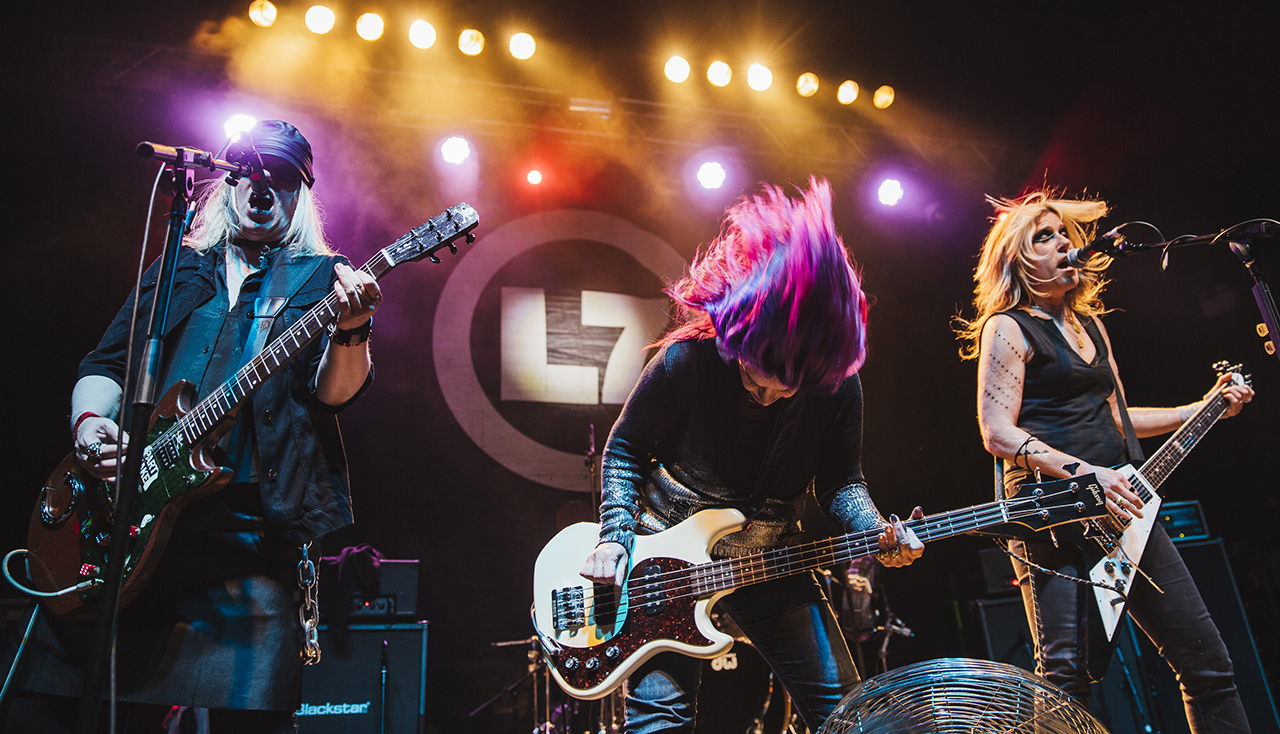
You did come around to Marshall in the ’90s, right?
“It took me a long time to finally cave in. I got a JCM800 or something. If you see photos of us through the early ’90s, I’m playing a Music Man. Then, I switched to a Fender Bassman head and had to get distortion through a pedal. I was just digging my heels. Now we’re playing with Blackstar heads, which sound fucking great.”
Can you remember putting together Shove from Smell the Magic?
“I didn’t have a 4x12 cabinet yet – I had a 2x18 cabinet for some reason, and one of the speakers was ripped. I said to our producer, Jack Endino, ‘Jack, oh, man, my fucking speaker’s ripped.’ He’s like, ‘Don’t worry about it; put the microphone there.’
Butch Vig was a stickler for tuning… He used a strobe tuner. It was kind of maddening at times
“So part of the sound, literally, is a shredded cone on that speaker cabinet. And I had a really great pedal that starts off Shove; a vintage Maestro Fuzztone, which I still have. It had that really abrasive, great sound. We knew we were onto something when we recorded Shove.”
L7’s next record, Bricks Are Heavy, put you on the map. How did working with Butch Vig impact your guitar approach?
“He was a stickler for tuning, I’ll tell you that! He used a strobe tuner. It was kind of maddening at times, but Butch was great because he has a real pop side. He was really encouraging of that side of us, especially me doing a backing vocal and adding more pop elements into our grungy, basic tracks.”
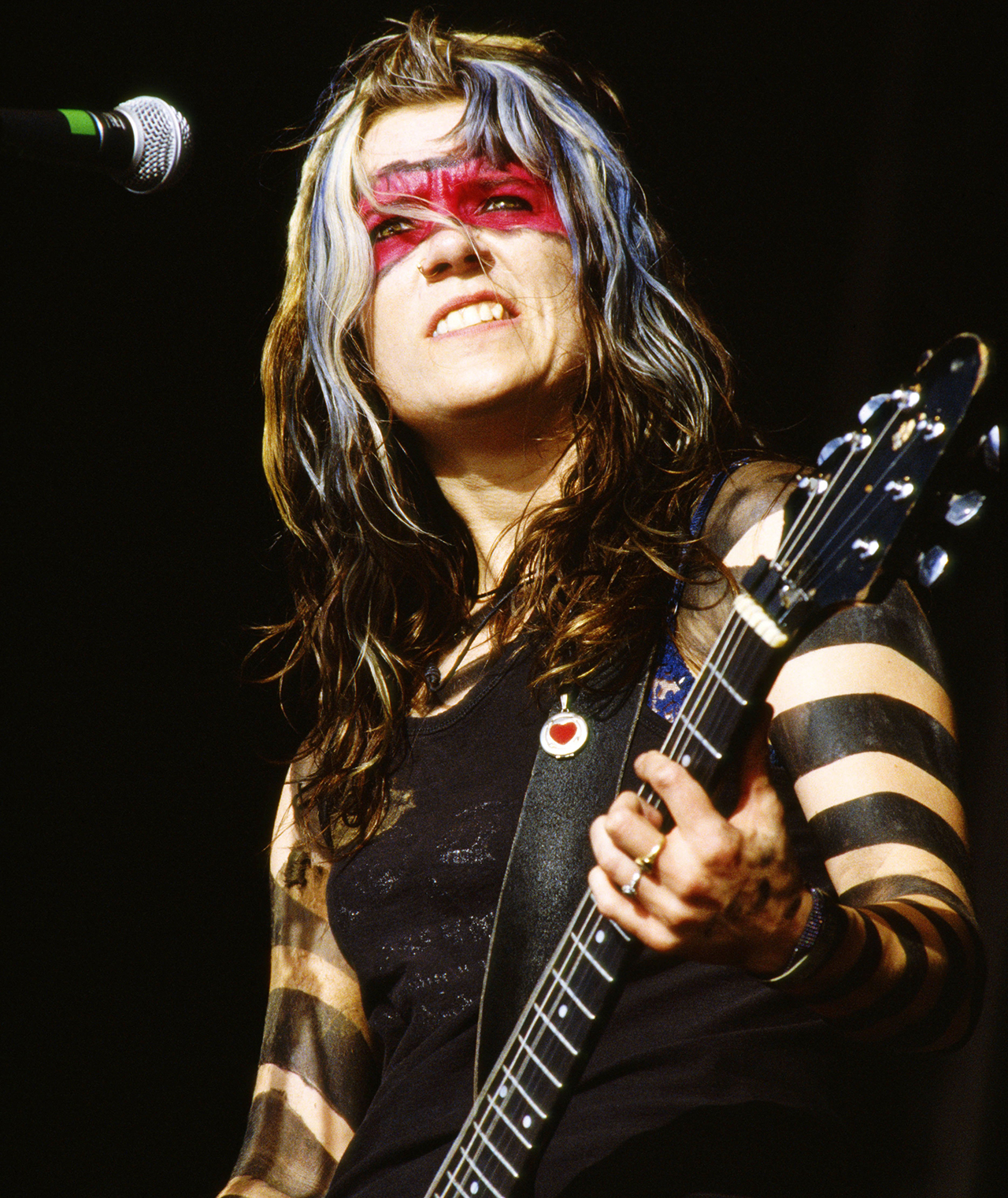
What was your rig like once you got out on tour and started playing festivals like Reading and Glastonbury?
“Same crappy stuff! But at that point, I was playing Epiphone Flying Vs because the folks at Epiphone were kind enough to give me free guitars. Those were great. I always needed a tremolo bar, so they had those – but sometimes I’d break them by throwing them off and they’d have to get repaired. There was a lot of duct tape going on with all our stuff!”
L7’s appearance at Reading in ’92 is infamous – what happened?
“The airline lost our gear. We recovered our guitars but our pedals were non-existent. We were borrowing stuff from other bands. When you play festivals, you don’t get a soundcheck unless you’re the headliner. We were like the third band or something.
“There was a lot of feedback onstage. The crowd got ugly and they were just being assholes, throwing mud at us for the whole set – you know, really assaulting us, like hitting us hard on our bodies and shit, and on our guitars.
“It really felt like an assault. So I pulled my tampon out and I threw it at them. It’s weird; if you’re a woman in rock, you’re a minority. It felt like even though other bands got mud thrown at them that day, there was a bit of a misogynist bent to what happened to us.
“We’d been popular in England and continued to be. But that crowd just got really fucking shit-faced, unruly and violent with us. So, I did the most feminist, absurdist thing I could think of. And I was flowing that day!”
You had to take action, right?
“I don’t know what I could have done. But we weren’t going to leave the stage, you know? It was such a disappointment too, because we were really looking forward to that show. That concert broke a lot of bands and we were thinking, ‘Oh, man, maybe we’ve got a shot at being bigger than we are.’ It didn’t happen. That’s the way the mud clump crumbles!”
How did your rig and approach evolve on L7’s records from the mid 1990s – Hungry for Stink, The Beauty Process: Triple Platinum, and Slap-Happy?
“I was experimenting more with other genre influences that I liked. I had a couple of songs with no distortion, like Off the Wagon, which is just really bouncy. I was using more strange pedals to get the sounds I wanted, like tremolo stuff and just different sounds.”
How did that impact your solo record, Transmiticate?
“By then I’d switched to a 1963 Gibson Melody Maker because it was lighter. The Flying V was very much my L7 identity, and I wanted to switch stage personas by playing a different guitar. I put in some hotter pickups, and it had a really good sound. I was still using a Marshall JC800, but the songwriting was a little different.
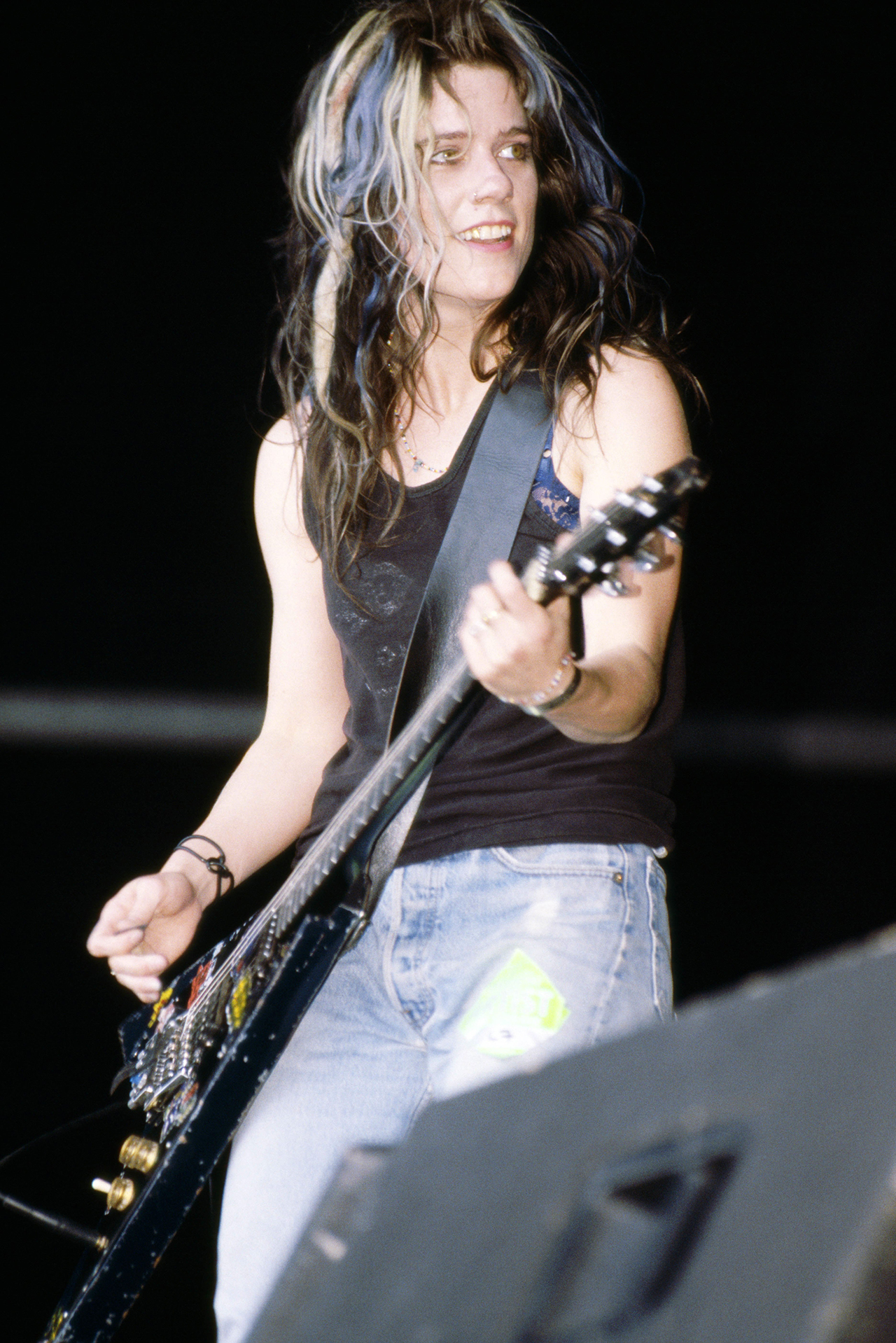
“I played more clean stuff, but my playing style is consistent. I do a lot of sliding into notes, as opposed to bending into notes. I don’t like a lot of wanking – I like catchy solos; I’ll slide into them and just find something very simple and repetitive, with very few alternations to it. I’m still that way.”
With Scatter the Rats – L7’s first record in 20 years – was it a challenge to get back into that guitar mode?
“It wasn’t difficult for me. Even during our hiatus, I kept playing and writing, so that helped. Suzi put her guitar under the bed and didn’t touch it for 20 years. That happens to a lot of players; they get their heart broken in rock ’n’ roll and they just put it away.
I mean, I hear anger anthems now and it’s like, ‘Whoa, take it easy!’ Ours are more joyous anger anthems!
“I have quite a few friends who are like, ‘Oh man, I haven’t played in years.’ I mean, I’m not in love with playing my guitar all the time, but I play it. With Scatter the Rats I just jumped right back in and had a good time doing it.”
Where does your rig stand today?
“Gibson has been very good to us. We all play Gibsons now. Suzi plays a Melody Maker and I’m on a Flying V. And we’re using the 50-watt St. James by Blackstar, which is lightweight. Ladies, you will fucking love it – it sounds great and it weighs seven pounds. Finally someone is making good amps that don’t weigh a ton!”
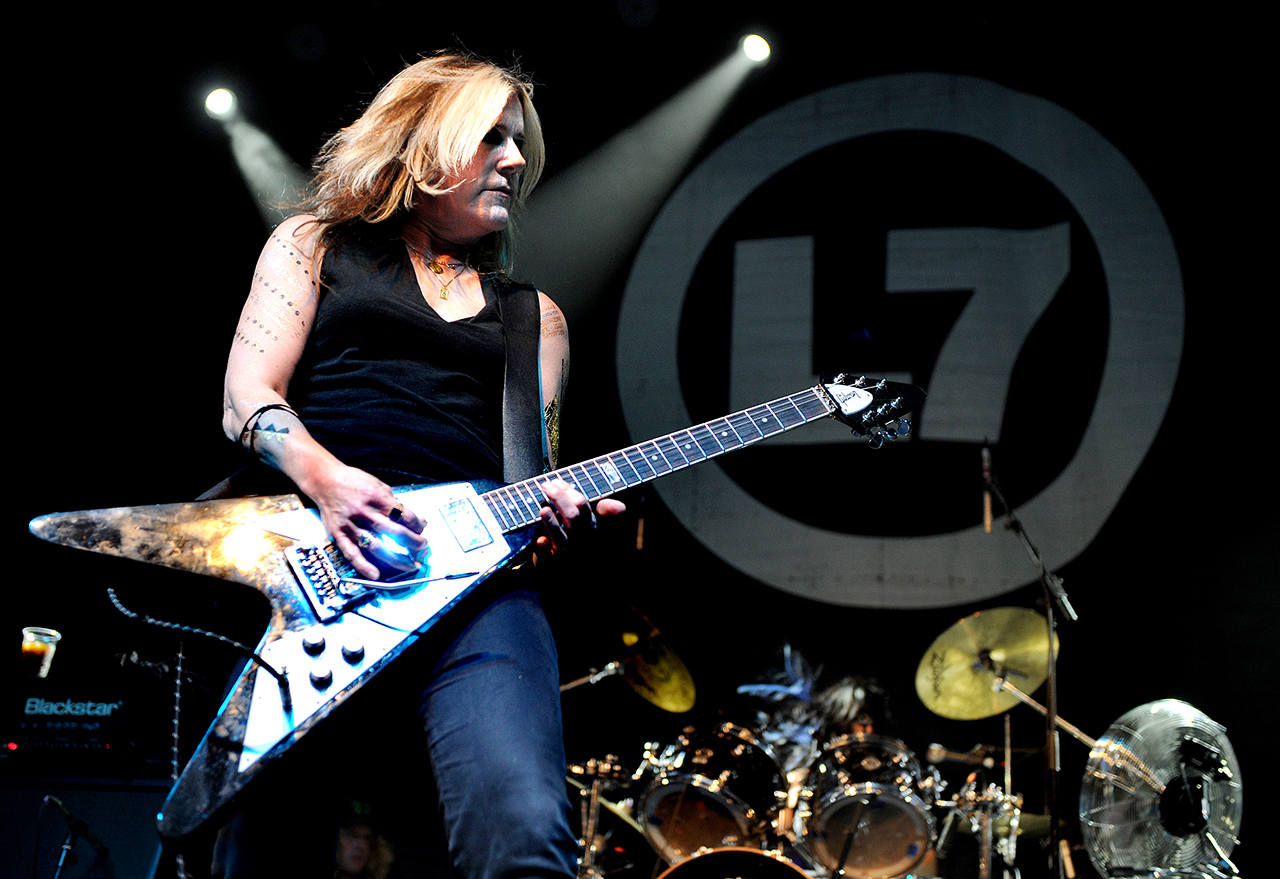
After playing Epiphones for so long, can you point out the biggest differences with Gibson?
“Gibsons might have a heavier weight to them. I could be wrong; maybe it’s just an illusion that they’re more substantial. They’re great guitars, but I will say this: I had to drill a fucking hole in my Gibson because it didn’t have a tremolo bar in it.
“I got a Gibson from my loved one, and I didn’t have the heart to say, ‘Shit, man, I need a tremolo bar.’ So I had to drill in and put a Kahler on there, which I love. My guitar guy didn’t like doing that at all – ‘It’s kind of risky…’”
Heartbreak is associated with L7’s first run. Your recent experience must be more gratifying.
“One of the best compliments I hear is that our songs stand up to time. The hats I wear – singer, guitar player, songwriter – the fact that the songs stand up for me, and there’s meaning for other people in those songs, is great.”
Why do you think the songs resonate with people?
“We have a lot of anger anthems in L7, and people really dig them. I mean, I hear anger anthems now and it’s like, ‘Whoa, take it easy!’ Ours are more joyous anger anthems! When they’re singing Shitlist they’ve got smiles on their faces, flipping off and laughing at the same time. They’re kind of tongue-in-cheek anger anthems, but they hold up.”
What are you most proud of as a guitarist when you look back?
“I’m most proud of my downstroke rhythm playing a la Ramones barre chords, sliding those chords all over the neck, and downstroking. I think my time is good, and just that steady throb of the guitar and my leads.
“I’m most proud of the catchy ones that also sound bent. I’m using half-steps in places you might not expect, so they’re catchy but don’t sound stock.”
It’s been five years since Scatter the Rats. Does L7 have another record to come?
“It doesn’t feel like five years! Time gets really weird when you get older. I like the idea of putting out singles. If we were to fire off an album, we’d need some support from a label. We’re not signed and we don’t have a huge management company.
“Our perception is we're doing great, though. Singles and EPs, maybe we can pull off in this day and age.”
- Keep up to date with L7’s tour itinerary.
Andrew Daly is an iced-coffee-addicted, oddball Telecaster-playing, alfredo pasta-loving journalist from Long Island, NY, who, in addition to being a contributing writer for Guitar World, scribes for Bass Player, Guitar Player, Guitarist, and MusicRadar. Andrew has interviewed favorites like Ace Frehley, Johnny Marr, Vito Bratta, Bruce Kulick, Joe Perry, Brad Whitford, Tom Morello, Rich Robinson, and Paul Stanley, while his all-time favorite (rhythm player), Keith Richards, continues to elude him.
“I loved working with David Gilmour… but that was an uneasy collaboration”: Pete Townshend admits he’s not a natural collaborator – even with bandmates and fellow guitar heroes
“This guy kept calling saying, ‘I’ve never been in a band before, but I’m the best guitarist ever.’ When I heard him play it was like a fire from heaven”: The life and times of Killing Joke visionary Geordie Walker – the guitar hero’s guitar hero



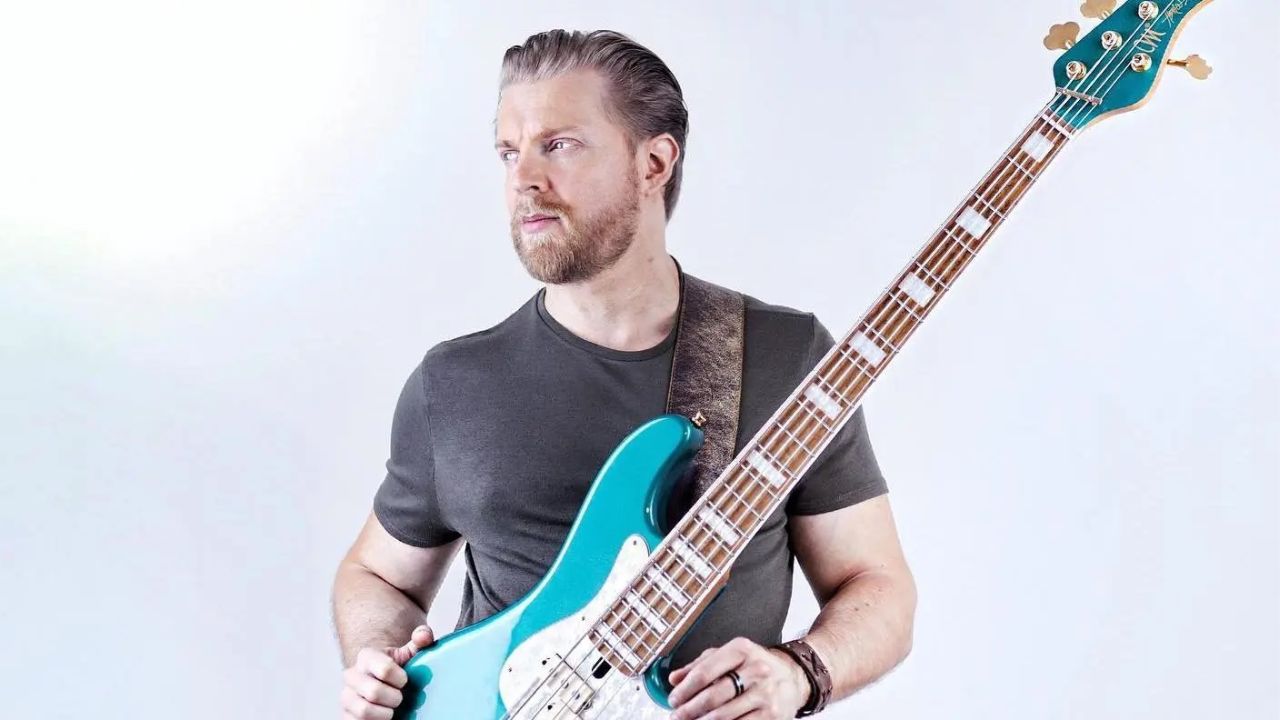







![[from left] George Harrison with his Gretsch Country Gentleman, Norman Harris of Norman's Rare Guitars holds a gold-top Les Paul, John Fogerty with his legendary 1969 Rickenbacker](https://cdn.mos.cms.futurecdn.net/TuH3nuhn9etqjdn5sy4ntW.jpg)
